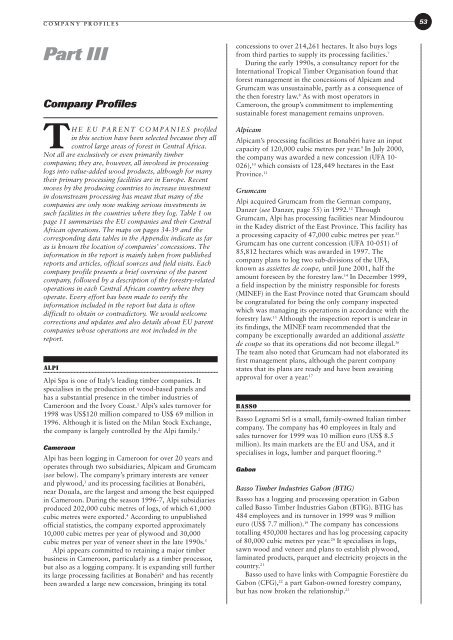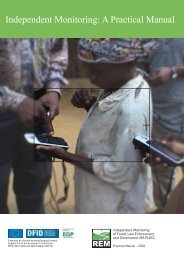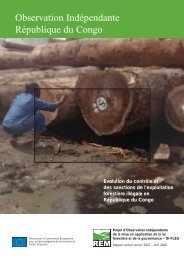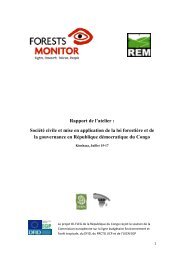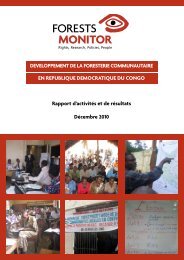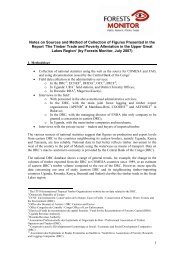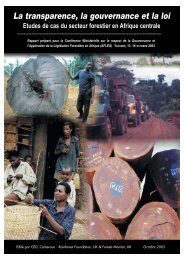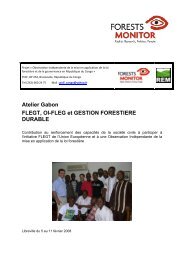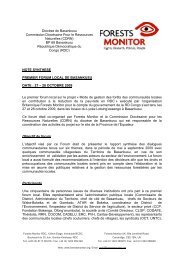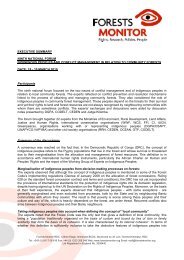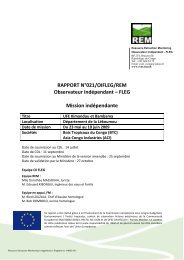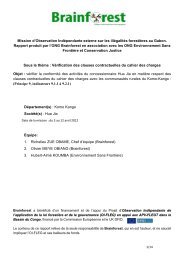Sold down the river - Salva le Foreste
Sold down the river - Salva le Foreste
Sold down the river - Salva le Foreste
Create successful ePaper yourself
Turn your PDF publications into a flip-book with our unique Google optimized e-Paper software.
COMPANY PROFILES 53Part IIICompany Profi<strong>le</strong>sTHE EU PARENT COMPANIES profi<strong>le</strong>din this section have been se<strong>le</strong>cted because <strong>the</strong>y allcontrol large areas of forest in Central Africa.Not all are exclusively or even primarily timbercompanies; <strong>the</strong>y are, however, all involved in processinglogs into value-added wood products, although for many<strong>the</strong>ir primary processing facilities are in Europe. Recentmoves by <strong>the</strong> producing countries to increase investmentin <strong>down</strong>stream processing has meant that many of <strong>the</strong>companies are only now making serious investments insuch facilities in <strong>the</strong> countries where <strong>the</strong>y log. Tab<strong>le</strong> 1 onpage 11 summarises <strong>the</strong> EU companies and <strong>the</strong>ir CentralAfrican operations. The maps on pages 34-39 and <strong>the</strong>corresponding data tab<strong>le</strong>s in <strong>the</strong> Appendix indicate as faras is known <strong>the</strong> location of companies’ concessions. Theinformation in <strong>the</strong> report is mainly taken from publishedreports and artic<strong>le</strong>s, official sources and field visits. Eachcompany profi<strong>le</strong> presents a brief overview of <strong>the</strong> parentcompany, followed by a description of <strong>the</strong> forestry-relatedoperations in each Central African country where <strong>the</strong>yoperate. Every effort has been made to verify <strong>the</strong>information included in <strong>the</strong> report but data is oftendifficult to obtain or contradictory. We would welcomecorrections and updates and also details about EU parentcompanies whose operations are not included in <strong>the</strong>report.ALPIAlpi Spa is one of Italy’s <strong>le</strong>ading timber companies. Itspecialises in <strong>the</strong> production of wood-based panels andhas a substantial presence in <strong>the</strong> timber industries ofCameroon and <strong>the</strong> Ivory Coast. 1 Alpi’s sa<strong>le</strong>s turnover for1998 was US$120 million compared to US$ 69 million in1996. Although it is listed on <strong>the</strong> Milan Stock Exchange,<strong>the</strong> company is largely control<strong>le</strong>d by <strong>the</strong> Alpi family. 2CameroonAlpi has been logging in Cameroon for over 20 years andoperates through two subsidiaries, Alpicam and Grumcam(see below). The company’s primary interests are veneerand plywood, 3 and its processing facilities at Bonabéri,near Douala, are <strong>the</strong> largest and among <strong>the</strong> best equippedin Cameroon. During <strong>the</strong> season 1996-7, Alpi subsidiariesproduced 202,000 cubic metres of logs, of which 61,000cubic metres were exported. 4 According to unpublishedofficial statistics, <strong>the</strong> company exported approximately10,000 cubic metres per year of plywood and 30,000cubic metres per year of veneer sheet in <strong>the</strong> late 1990s. 5Alpi appears committed to retaining a major timberbusiness in Cameroon, particularly as a timber processor,but also as a logging company. It is expanding still fur<strong>the</strong>rits large processing facilities at Bonabéri 6 and has recentlybeen awarded a large new concession, bringing its totalconcessions to over 214,261 hectares. It also buys logsfrom third parties to supply its processing facilities. 7During <strong>the</strong> early 1990s, a consultancy report for <strong>the</strong>International Tropical Timber Organisation found thatforest management in <strong>the</strong> concessions of Alpicam andGrumcam was unsustainab<strong>le</strong>, partly as a consequence of<strong>the</strong> <strong>the</strong>n forestry law. 8 As with most operators inCameroon, <strong>the</strong> group’s commitment to imp<strong>le</strong>mentingsustainab<strong>le</strong> forest management remains unproven.AlpicamAlpicam’s processing facilities at Bonabéri have an inputcapacity of 120,000 cubic metres per year. 9 In July 2000,<strong>the</strong> company was awarded a new concession (UFA 10-026), 10 which consists of 128,449 hectares in <strong>the</strong> EastProvince. 11GrumcamAlpi acquired Grumcam from <strong>the</strong> German company,Danzer (see Danzer, page 55) in 1992. 12 ThroughGrumcam, Alpi has processing facilities near Mindourouin <strong>the</strong> Kadey district of <strong>the</strong> East Province. This facility hasa processing capacity of 47,000 cubic metres per year. 13Grumcam has one current concession (UFA 10-051) of85,812 hectares which was awarded in 1997. Thecompany plans to log two sub-divisions of <strong>the</strong> UFA,known as assiettes de coupe, until June 2001, half <strong>the</strong>amount foreseen by <strong>the</strong> forestry law. 14 In December 1999,a field inspection by <strong>the</strong> ministry responsib<strong>le</strong> for forests(MINEF) in <strong>the</strong> East Province noted that Grumcam shouldbe congratulated for being <strong>the</strong> only company inspectedwhich was managing its operations in accordance with <strong>the</strong>forestry law. 15 Although <strong>the</strong> inspection report is unc<strong>le</strong>ar inits findings, <strong>the</strong> MINEF team recommended that <strong>the</strong>company be exceptionally awarded an additional assiettede coupe so that its operations did not become il<strong>le</strong>gal. 16The team also noted that Grumcam had not elaborated itsfirst management plans, although <strong>the</strong> parent companystates that its plans are ready and have been awaitingapproval for over a year. 17BASSOBasso Legnami Srl is a small, family-owned Italian timbercompany. The company has 40 employees in Italy andsa<strong>le</strong>s turnover for 1999 was 10 million euro (US$ 8.5million). Its main markets are <strong>the</strong> EU and USA, and itspecialises in logs, lumber and parquet flooring. 18GabonBasso Timber Industries Gabon (BTIG)Basso has a logging and processing operation in Gaboncal<strong>le</strong>d Basso Timber Industries Gabon (BTIG). BTIG has484 employees and its turnover in 1999 was 9 millioneuro (US$ 7.7 million). 19 The company has concessionstotalling 450,000 hectares and has log processing capacityof 80,000 cubic metres per year. 20 It specialises in logs,sawn wood and veneer and plans to establish plywood,laminated products, parquet and e<strong>le</strong>ctricity projects in <strong>the</strong>country. 21Basso used to have links with Compagnie Forestière duGabon (CFG), 22 a part Gabon-owned forestry company,but has now broken <strong>the</strong> relationship. 23


